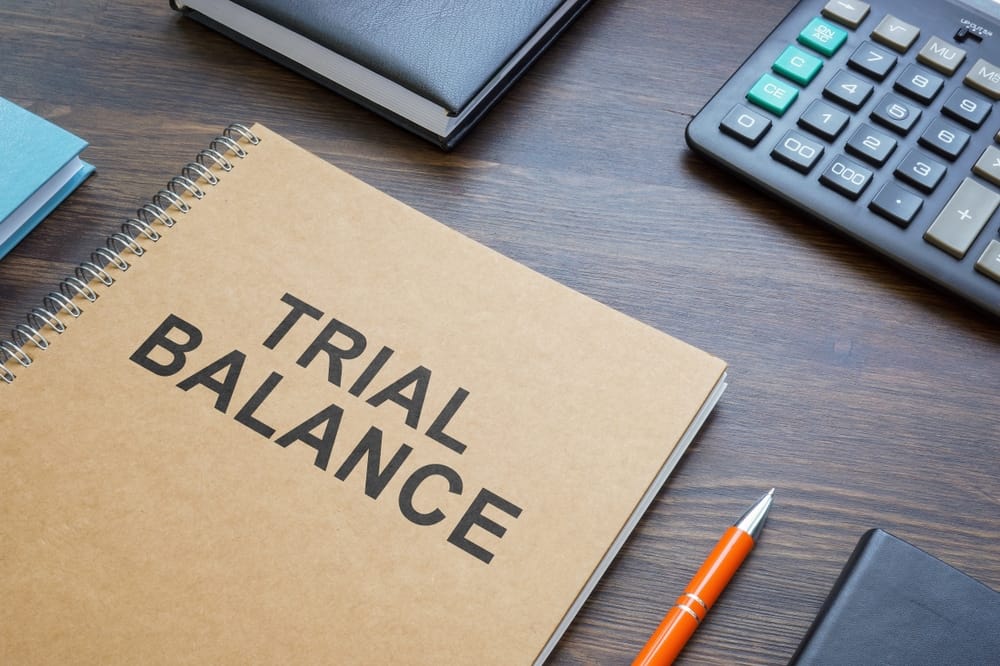This article will offer an explanation of trial balances in the UK, including what data is included in this financial document, as well as how to create one.
Overview of a Trial Balance
A trial balance is a financial document used to ensure the debit balances and credit balances are kept in check for all general ledger accounts. Each general ledger is listed on the trial balance sheet, and two columns for debit and credit can be found to the right. At the bottom of the table, a “total balances” column will be displayed.

Data Included in a Trial Balance Sheet
Typical trial balance sheets will include the following:
- The accounting period dates
- The account numbers
- The account names
- Credits and debits to each account
- The total balance
Why Create a Trial Balance?
You should create a trial balance table to ensure that your company’s books are balanced. It is a key part of determining accuracy in a double-entry accounting system. In this accounting system, every transaction affects at least two accounts. By accounts, we mean either liabilities, assets, expenses, revenues, equity, and so on.
Whenever a transaction occurs, one of these accounts is credited while the other is debited. These effects must equal each other and should be checked as such.
How do you check this with a trial balance?
The “total balances” column in a trial balance should be equal for both credit and debits of each general ledger. This is the entire purpose of a trial balance. If the “total balances” aren’t equal, it means that something has been recorded incorrectly. In these instances, the accountant will then have to go over their accounts and check for discrepancies.
However, the “total balances” being equal does not always mean that your accounting data is error-free. Transactions could still be classified improperly or may not have been recorded at all. So, a trial balance should not be seen as definitive proof of accuracy.
When Should You Create A Trial Balance?
Trial balances should be created regularly, with a final one being created at the end of the accounting period. This will ensure that finances are kept in check throughout the year.
Most accounting software will create trial balance tables on behalf of the accountant. However, accountants may wish to create a trial balance whenever they feel unsure of their work.
Trial balances are also useful when creating a balance sheet, preparing financial statements, or creating your annual accounts.
Although somewhat redundant in modern accountancy, being able to create a trial balance sheet remains a useful skill to have.
How to Create a Trial Balance
To create a trial balance, you need to first finish creating a general ledger. In this ledger, you’ll have recorded all of your company’s transactions. Once complete, you can follow these instructions:
- List all the ledger accounts on a worksheet. This list should include the likes of common stock, accounts payable, accounts receivable, assets, utility expense accounts, and so on.
- Create two separate columns to the right of each account. One for debit balances and one for credit balances.
- For each account, record debit balances and credit balances in the appropriate column.
- Add a new line at the bottom of the trial balance table titled “total balances”.
- Add up all the debit balances and put this in the total debit balance section. Similarly, count up all the credit and add it to the total credit balance section.
- If these total balances are not equal, then there’s something incorrect about your account balances. You should review your account categorizations, amounts, and transactions to see if anything is listed incorrectly or is missing.
What is An Adjusted Trial Balance?
If the initial unadjusted trial balance is not equal, then you can create an adjusted trial balance once you have resolved any discrepancies. Adjustments to your trial balance can also be made to prepaid expenses, unearned revenue, bad debt expenses, depreciation, liabilities that have not been incurred, or advanced payments.
Final Thoughts
Using the trial balance format is a simple way to identify discrepancies in your accountancy. By practising trial balance accounting, you can create more accurate financial statements.
If you’re unsure about double-entry bookkeeping, you should hire a professional accountant.
Sources:
https://gocardless.com/guides/posts/what-is-a-trial-balance/